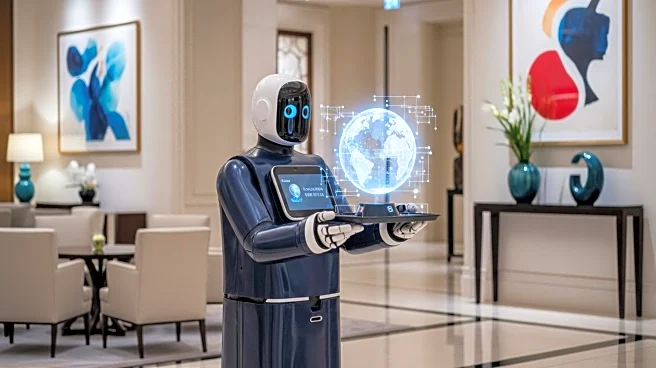What is the story about?
What's Happening?
The Destination AI Conference for Hoteliers, held in Washington DC, focused on the integration of artificial intelligence (AI) within the hospitality industry. The conference, now in its second year, aimed to distinguish between AI hype and practical applications. Key discussions revolved around AI's potential to enhance guest engagement, drive revenue growth, and improve operational efficiency. Despite a recent MIT study suggesting that 95% of organizations see no return on AI investments, industry leaders argued that success metrics need reevaluation. The conference emphasized the importance of making AI scalable and integrating it into existing systems to solve real business problems. The hospitality sector is urged to adopt consumer-driven AI trends, as consumer adoption in travel planning is significantly ahead of retail.
Why It's Important?
AI's integration into the hospitality industry is crucial for maintaining competitiveness and enhancing customer experiences. By leveraging AI, hotels can personalize guest interactions, streamline operations, and potentially reclaim market share from online travel agencies (OTAs). The industry's ability to adapt to AI-driven changes could lead to significant cost reductions and improved service delivery. As AI becomes more prevalent, hotels must focus on creating an AI-first culture, which involves upskilling employees and aligning technology with business goals. The shift towards AI could redefine marketing strategies and customer journey mapping, offering hotels a chance to differentiate themselves in a rapidly evolving market.
What's Next?
The hospitality industry is expected to continue exploring AI applications, with a focus on creating centralized data systems and fostering an AI-first culture. Hotels will need to ensure their Availability Rates Inventory (ARI) is portable and structured for AI compatibility. This could lead to a reduction in reliance on traditional booking systems. As AI agents increasingly handle bookings, hotels must adapt their marketing strategies to appeal to both human and machine decision-makers. The industry will likely see further experimentation with AI technologies, aiming to solve fragmentation issues and enhance guest personalization.
Beyond the Headlines
The conference highlighted the ethical and cultural implications of AI in hospitality, particularly regarding human interaction. While AI can automate many processes, the importance of maintaining personal connections with guests remains paramount. The industry faces the challenge of balancing technological advancements with the human touch that defines hospitality. Additionally, the shift towards AI-driven systems raises questions about data privacy and security, necessitating robust governance frameworks to protect consumer information.















